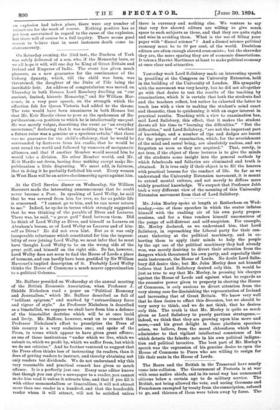Yesterday week Lord Salisbury made an interesting speechr in presiding
at the Congress on University Extension, held. in the building of the University of London. His sympathy with the movement was very hearty, but he did not altogether go with that desire to test the results of the teaching by examinations, which it is certain that both the students feel and the teachers reflect, but rather he exhorted the latter to• teach less with a view to making the student's mind exact and theoretic, than to quickening it with an eager interest in practical results. Teaching with a view to examination has, said Lord Salisbury, this effect, that it makes the student devote all his time to "learning the difficulties." "But the- difficulties," said Lord Salisbury, "are not the important part of knowledge, and a number of tips and dodges are learnt for the purpose of examination, which, for the nourishment of the mind and moral being, are absolutely useless, and are forgotten as soon as they are acquired." That, surely, is- not true, if the object of these lectures is to give the minds, of the students some insight into the general methods by which falsehoods and fallacies are eliminated and truth is obtained. It is true only if their object is to fill the hearers- with practical lessons for the conduct of life. So far as we- understand the University Extension movement, it is meant to extend mental culture, and not merely to diffuse more- widely practical knowledge. We suspect that Professor Jebb• took a very different view of the meaning of this University Extension movement from that of Lord Salisbury.


















































 Previous page
Previous page